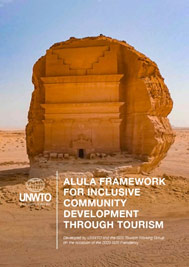Turismo Rural
ONU Turismo entiende el turismo rural como “un tipo de actividad turística en el que la experiencia del visitante está relacionada con un amplio espectro de productos vinculados por lo general con las actividades de naturaleza, la agricultura, las formas de vida y las culturas rurales, la pesca con caña y la visita a lugares de interés.
Las actividades de turismo rural se desarrollan en entornos no urbanos (rurales) con las siguientes características: i) baja densidad demográfica, ii) paisajes y ordenación territorial donde prevalecen la agricultura y la silvicultura, y iii) estructuras sociales y formas de vida tradicionales”.
El turismo rural, al igual que el turismo de montaña, tiene un gran potencial para estimular el crecimiento de la economía local y el cambio social, por su complementariedad con otras actividades económicas, su contribución al PIB y la creación de empleo y su capacidad de promover la dispersión de la demanda en el tiempo (lucha contra la estacionalidad) y a lo largo del territorio.
Best Tourism Villages by UN Tourism
Con la visión de convertir el turismo en una fuerza positiva para la transformación, el desarrollo rural y el bienestar de las comunidades, ONU Turismo pone en marcha la iniciativa ‘Best Tourism Villages by UN Tourism’.
Aspira a impulsar el papel del turismo en la valoración y salvaguarda de los pueblos rurales junto con sus paisajes, sistemas de conocimientos, diversidad biológica y cultural y sus valores y actividades locales (agricultura, silvicultura, ganadería y/o pesca), incluida su gastronomía.
RESEARCH
UNWTO Recommendations on Tourism and Rural Development
 The sustainability of tourism in rural areas will only be successful if a comprehensive, inclusive planning strategy is adopted and implemented based on a multi-action and multi-stakeholder participatory approach. The UNWTO Recommendations on Tourism and Rural Development, approved by the 24th session of the UNWTO General Assembly (A/RES/732(XXIV), aim to support governments at various levels, as well as the private sector and the international community in developing tourism in rural territories in a way that contributes to inclusive, sustainable and resilient development.
The sustainability of tourism in rural areas will only be successful if a comprehensive, inclusive planning strategy is adopted and implemented based on a multi-action and multi-stakeholder participatory approach. The UNWTO Recommendations on Tourism and Rural Development, approved by the 24th session of the UNWTO General Assembly (A/RES/732(XXIV), aim to support governments at various levels, as well as the private sector and the international community in developing tourism in rural territories in a way that contributes to inclusive, sustainable and resilient development.
AlUla Framework for inclusive Community Development through Tourism
 Under the leadership of the 2020 G20 Saudi Presidency, the World Tourism Organization (UNWTO) and the G20 Tourism Working Group have developed the AlUla Framework for Inclusive Community Development through Tourism to help fulfil the sector’s potential to contribute to and achieve inclusive community development and the Sustainable Development Goals.
Under the leadership of the 2020 G20 Saudi Presidency, the World Tourism Organization (UNWTO) and the G20 Tourism Working Group have developed the AlUla Framework for Inclusive Community Development through Tourism to help fulfil the sector’s potential to contribute to and achieve inclusive community development and the Sustainable Development Goals.
The Framework provides guidance and inspiration to all governments, as well as all other key stakeholders in the tourism sector – including regional and local governments, the private sector, industry associations, civil society, communities and tourists – with the aim of fostering a truly holistic and integrated approach to inclusive community development through tourism.
AlUla Framework for inclusive Community Development through Tourism
AlUla Framework for inclusive Community Development through Tourism – Executive Summary
International Rural Tourism Development – An Asia-Pacific Perspective
 This publication released on the occasion of the International Year for Sustainable Tourism for Development 2017, focuses on community empowerment and poverty alleviation through rural tourism development. The report shines a light on rural tourism development in the Asia Pacific region with fourteen specific case studies that show how communities have adapted a sustainable approach to rural tourism that stimulates economic growth, creates employment and improves the livelihood of communities.
This publication released on the occasion of the International Year for Sustainable Tourism for Development 2017, focuses on community empowerment and poverty alleviation through rural tourism development. The report shines a light on rural tourism development in the Asia Pacific region with fourteen specific case studies that show how communities have adapted a sustainable approach to rural tourism that stimulates economic growth, creates employment and improves the livelihood of communities.
International Rural Tourism Development – An Asia-Pacific Perspective


